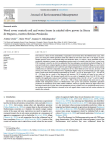Cerdà A., Terol E., Daliakopoulos I.N. (2021). Weed cover controls soil and water losses in rainfed olive groves in Sierra de Enguera, eastern Iberian Peninsula. Journal of Environmental Management, 15/07/2021, vol. 290, p. 1-9.
https://doi.org/10.1016/j.jenvman.2021.112516
https://doi.org/10.1016/j.jenvman.2021.112516
| Titre : | Weed cover controls soil and water losses in rainfed olive groves in Sierra de Enguera, eastern Iberian Peninsula (2021) |
| Auteurs : | A. Cerdà ; E. Terol ; I.N. Daliakopoulos |
| Type de document : | Article |
| Dans : | Journal of Environmental Management (vol. 290, July 2021) |
| Article en page(s) : | p. 1-9 |
| Langues : | Anglais |
| Langues du résumé : | Anglais |
| Catégories : |
Catégories principales 06 - AGRICULTURE. FORÊTS. PÊCHES ; 6.4 - Production Agricole. Système de ProductionThésaurus IAMM SYSTEME DE PRODUCTION ; DURABILITE ; OLIVE ; OLEA EUROPAEA ; EROSION ; COUVERTURE DU SOL ; ESPAGNE |
| Résumé : | Soil erosion is a threat for the sustainability of agriculture and severely affects the Mediterranean crops. Olive groves are among the rainfed agriculture lands that exhibit soil and water losses due to the impact of unsustainable practices such as conventional tillage and herbicides abuse. To achieve a more sustainable olive oil production, alternative, greener crop management practices need to be tested in the field. Here, a weed cover (CW) treatment is tested at an olive tree plantation that has undergone conventional mechanical tillage for 20 years and results were compared against an adjacent control plantation that maintained tillage as a weed control strategy (CO). Both plantations were under the same tillage management for centuries and macroscopic analysis confirms they are otherwise comparable. Compared to the CO, where tilled soil cover was zero, 20 years of CW (weeds cover 64%; litter cover 5%) had led to significantly higher values of soil bulk density and soil organic matter. Results from rainfall simulation experiments at 55 mm h−1 on 0.25 m2 plots under CO (N = 25) and CW (N = 25) show that as a result of the improved soil structure, CW (i) reduced soil losses by two orders of magnitude (140 times), (ii) decreased runoff yield by one order of magnitude (from 2.65 till 27.6% of the rainfall), (iii) significantly reduced runoff sediment concentration (from 18.6 till 1.43 g l−1), and (iv) significantly delayed runoff generation (CO = 273 s; CW = 788 s). These results indicate that weed cover is a sustainable land management practice in Mediterranean olive groves and promotes sustainable agriculture production in mountainous areas under rainfed conditions, which are typically affected by high erosion rates such those found in the CO plots. Due to the spontaneous recovery of plant cover, we conclude that weed cover is an excellent nature-based solution to increase in the soil organic matter content and soil erosion reduction in rainfed olive orchards. |
| Cote : | Réservé lecteur CIHEAM |
| URL / DOI : | https://doi.org/10.1016/j.jenvman.2021.112516 |







